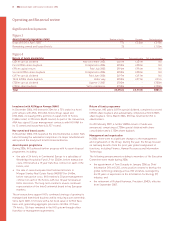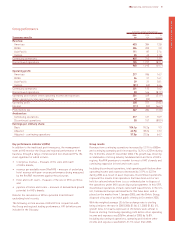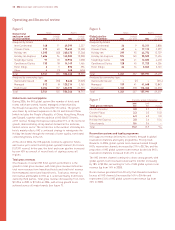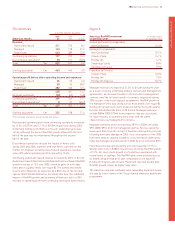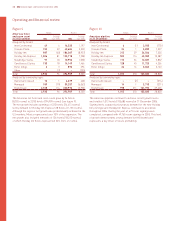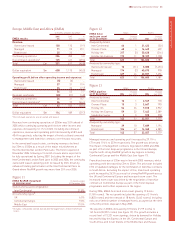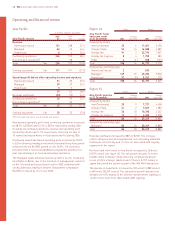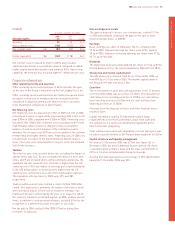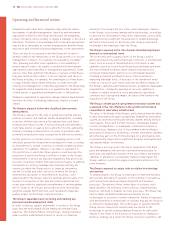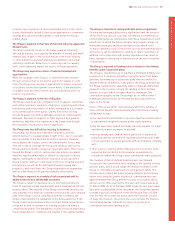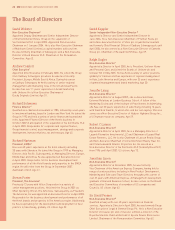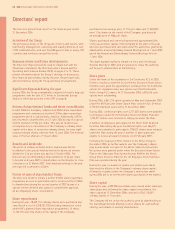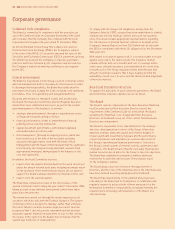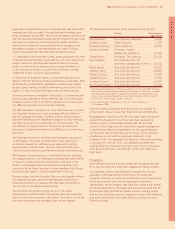Holiday Inn 2006 Annual Report Download - page 20
Download and view the complete annual report
Please find page 20 of the 2006 Holiday Inn annual report below. You can navigate through the pages in the report by either clicking on the pages listed below, or by using the keyword search tool below to find specific information within the annual report.
Competition with other hotel companies may generally reduce
the number of suitable management, franchise and investment
opportunities offered to the Group and increase the bargaining
power of property owners seeking to engage a manager or become a
franchisee. The terms of new management or franchise agreements
may not be as favourable as current arrangements and the Group
may not be able to renew existing arrangements on the same terms.
There can also be no assurance that the Group will be able to
identify, retain or add franchisees to the Group system or to secure
management contracts. For example, the availability of suitable
sites, planning and other local regulations or the availability of
finance may all restrict the supply of suitable hotel development
opportunities under franchise or management agreements. There
are also risks that significant franchisees or groups of franchisees
may have interests that conflict, or are not aligned, with those of
the Group including, for example, the unwillingness of franchisees
to support brand improvement initiatives. In connection with
entering into management or franchise agreements, the Group may
be required to make investments in or guarantee the obligations
of third parties or guarantee minimum income to third parties.
Changes in legislation or regulatory changes may be implemented
that have the effect of favouring franchisees relative to brand
owners.
The Group is exposed to the risks of political and economic
developments
The Group is exposed to the risks of global and regional adverse
political, economic and financial market developments, including
recession, inflation and currency fluctuations that could lower
revenues and reduce income. A recession would adversely affect
room rates and/or occupancy levels and other income-generating
activities resulting in deterioration of results of operations and
potentially reducing the value of properties in affected economies.
Further political or economic factors or regulatory action could
effectively prevent the Group from receiving profits from, or selling
its investments in, certain countries, or otherwise adversely affect
operations. For example, changes to tax rates or legislation in
the jurisdictions in which the Group operates could decrease the
proportion of profits the Group is entitled to retain, or the Group’s
interpretation of various tax laws and regulations may prove to be
incorrect, resulting in higher than expected tax charges. In addition,
fluctuations in currency exchange rates between sterling, the
currency in which the Group reports its financial statements,
and the US dollar and other currencies in which the Group’s
international operations or investments do business, could
adversely affect the Group’s reported earnings and the value of its
business. Fluctuations of this type have been experienced over
recent years with the significant strengthening of sterling against
the US dollar. As the Group’s profits have become increasingly
weighted towards North America, such fluctuations may have
greater impact on the Group’s reported results.
The Group is dependent upon recruiting and retaining key
personnel and developing their skills
In order to develop, support and market its products, the Group
must hire and retain highly skilled employees with particular
expertise. The implementation of the Group’s strategic business
plans could be undermined by failure to recruit or retain key
personnel, the unexpected loss of key senior employees, failures
in the Group’s succession planning and incentive plans, or a failure
to invest in the development of key skills. Additionally, unless skills
are supported by a sufficient infrastructure to enable knowledge
and skills to be passed on, the Group risks losing accumulated
knowledge if key employees leave the Group.
The Group is exposed to the risk of events that adversely impact
domestic or international travel
The room rates and occupancy levels of the Group could be
adversely impacted by events that reduce domestic or international
travel, such as actual or threatened acts of terrorism or war,
epidemics (such as Severe Acute Respiratory Syndrome and avian
flu), travel-related accidents, travel-related industrial action,
increased transportation and fuel costs and natural disasters
resulting in reduced worldwide travel or other local factors
impacting individual hotels. A decrease in the demand for hotel
rooms as a result of such events may have an adverse impact on
the Group’s operations and financial results. In addition, inadequate
preparedness, contingency planning or recovery capability in
relation to a major incident or crisis may prevent operational
continuity and consequently impact the value of the brand or the
reputation of the Group.
The Group is reliant upon its proprietary reservation system and
is exposed to the risk of failures in the system and increased
competition in reservation infrastructure
The value of the brands of the Group is partly derived from the ability
to drive reservations through its proprietary HolidexPlus reservation
system, an electronic booking and delivery channel directly linked to
travel agents, hotels and internet networks. Inadequate disaster
recovery arrangements, or inadequate continued investment in
this technology, leading to loss of key communications linkages,
particularly in relation to HolidexPlus, internet reservation channels
and other key parts of the IT infrastructure for a prolonged period,
or permanently, may result in significant business interruption and
subsequent impact on revenues.
The Group is also exposed to the risk of competition from third
party intermediaries who provide reservation infrastructure. In
particular, any significant increase in the use of these reservation
channels in preference to proprietary channels may impact the
Group’s ability to control the supply, presentation and price of its
room inventory.
The Group is exposed to certain risks in relation to technology
and systems
To varying degrees, the Group is reliant upon certain technologies
and systems (including IT systems) for the running of its business,
particularly those which are highly integrated with business
processes. Disruption to those technologies or systems could
adversely affect the efficiency of the business, notwithstanding
business continuity or disaster recovery processes. The Group may
have to make substantial additional investments in new
technologies or systems to remain competitive. Failing to keep pace
with developments in technologies or systems may put the Group at
a competitive disadvantage. The technologies or systems that the
Group chooses may not be commercially successful or the
technology or system strategy employed may not be sufficiently
aligned to the needs of the business or responsive to changes in
business strategy. As a result, the Group could lose customers, fail
Operating and financial review
18 IHG Annual report and financial statements 2006


